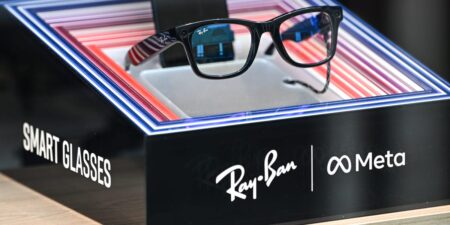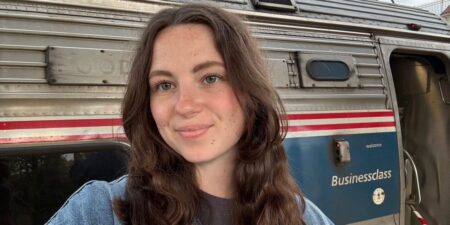X
Copy link
Impact Link
Save
Saved
Read in app
subscribers. Become an Insider
and start reading now.
Have an account? .
- Omada Health just became the second digital health company to IPO this year.
- The chronic care company saw its shares jump Friday morning by over 38% above its initial price.
- Here’s what Omada’s major investors’ stakes are worth after the public market debut.
Omada Health just went public at a $1.1 billion valuation — 14 years after its founding.
It’s the second digital health IPO of the year, following physical therapy company Hinge Health, which went public on May 21. The two IPOs come after a multiyear drought for healthcare public market debuts.
And so far, Omada’s IPO hasn’t disappointed. While the chronic care company priced its initial shares at $19, its stock opened at $23 a share and jumped as high as $28.40 Friday morning, nearly a 50% increase.
Omada Health launched in 2011 to provide virtual care for prediabetes, making its name in the years following for diabetes management.
In recent years, its business has surged in new areas beyond diabetes care. Omada’s weight care business has boomed as more patients taking GLP-1 drugs like Ozempic for weight loss seek companion care. The San Francisco-based company says most of its new employer and health plan clients approach Omada initially, interested in its metabolic health track.
Omada’s initial valuation of $1.1 billion is roughly where it was privately valued. Omada’s last private fundraise, a $192 million Series E round announced in February 2022, put Omada’s valuation over $1 billion.
It’s perhaps the best outcome Omada’s investors could’ve hoped for, given that many digital health startups now looking to IPO last raised at huge valuations during VC’s ZIRP period. Those valuations could be difficult to realize in today’s market. Hinge Health, for example, went public at a $2.6 billion valuation after being valued in its 2021 fundraise at $6.2 billion.
We don’t know what Omada Health’s investors paid for their shares, so we can’t calculate their profit. However, since Omada’s shares opened on the stock market at $23, we used that price to determine the worth of its investors’ stakes. None of Omada’s major investors sold any shares in its IPO.
Here’s what the stakes of Omada Health’s major investors and executives are worth after its IPO.
Revelation Partners, an investor: $120 million
Revelation Partners is a healthcare-focused investment firm that says it provides flexible capital to companies, especially to give liquidity to startups.
The firm first invested in Omada in September 2019, according to its website. Revelation Partners told Business Insider in an email that the firm invested in Omada through a series of secondary transactions. Omada hasn’t mentioned Revelation Partners in previous press releases about its fundraises.
Revelation Partners owns about 5.2 million shares, or 9.3% of the company. At the $23 market debut price, the firm’s stake is worth about $120 million.
US Venture Partners, an investor: $108.5 million
San Francisco-based US Venture Partners makes early-stage investments across healthcare, software, consumer, and security. The firm says it’s invested $4.5 billion across 532 companies.
USVP led Omada Health’s $4.7 million Series A fundraise in 2013. The firm contributed additional financing in Omada’s Series B through D rounds.
General partner Dr. Jonathan Root has served on Omada’s board of directors since the firm’s 2013 investment.
USVP owns about 4.72 million shares, or 8.5% of Omada Health. At the $23 market debut price, the firm’s stake is worth about $108.5 million.
Andreessen Horowitz, an investor: $106 million
VC giant Andreessen Horowitz, or A16z, first invested in Omada Health in 2015, when the firm led Omada’s $23 million Series B.
The firm went on to invest in Omada’s Series C and D fundraises, per PitchBook.
At the time of A16z’s 2015 investment, former general partner Balaji Srinivasan joined Omada’s board of directors. It’s unclear when he stepped down from the board; he moved into a part-time role at A16z that same year.
A16z owns about 4.6 million shares, or 8.3% of the company. At the $23 market debut price, the firm’s stake is worth about $106 million.
Fidelity Management and Research Company, an investor: $102 million
Fidelity Management and Research Company is the parent company of financial services giant Fidelity Investments. Fidelity has invested in a handful of healthcare startups over the years, leading rounds like now-public insurtech Oscar Health’s $400 million raise in 2016 and smart ring maker Oura’s $200 million Series D in December.
FMR led Omada’s $192 million Series E fundraise in February 2022.
Fidelity owns about 4.4 million shares, or 8.0% of the company. At the $23 market debut price, the firm’s stake is worth about $102 million.
Cigna Ventures, an investor: $79 million
Health insurance giant Cigna spun out a venture capital arm in 2018 to back healthcare companies. Omada Health was one of the firm’s first bets.
Cigna began working with the diabetes company in 2015. Two years later, the insurer announced an investment in Omada, leading a $50 million round in 2017 that Cigna Ventures later called Omada’s Series C-1 financing.
Cigna also expanded its partnership with Omada as part of its formal investment.
Cigna Ventures owns about 3.4 million shares, or 6.2% of the company. At the $23 market debut price, the firm’s stake is worth about $79 million.
aMoon Fund, an investor: $62 million
Israeli VC firm aMoon fund invests in healthcare and life sciences companies from early to late stages. Founded in 2016, it has backed a number of biotech companies that later went public, including Sophia Genetics, which went public in 2021, and Amylyx Pharmaceuticals, which went public in 2022.
The firm first invested in Omada Health in its $192 million Series E round in 2022.
“The entire space of all these clusters of diseases that includes diabetes, hypertension, and obesity is going through a major revolution right now,” aMoon Fund managing partner Tomer Berkowitz told BI. “The solution in the end will not just be based on drugs, but it’ll be a combination of drugs and behavioral change. I think Omada plays a significant role in that.”
aMoon owns about 2.7 million shares, or 4.9% of the company. At the $23 market debut price, the firm’s stake is worth about $62 million.
Norwest Venture Partners, an investor: $58 million
San Francisco-based Norwest Venture Partners invests in early- to late-stage startups. It’s backed more than 700 companies and manages over $15.5 billion in assets, per the firm. Its healthcare portfolio also includes hospital operations AI company Qventus, which raised $105 million in January led by private equity firm KKR, and behavioral health site Talkspace, which went public in a 2021 SPAC deal.
The firm led Omada’s $48 million Series C round in 2015 and put additional funding into Omada’s Series C-1 and D rounds.
Norwest owns about 2.5 million shares, or 4.5% of the company. At the $23 market debut price, the firm’s stake is worth about $58 million.
Sean Duffy, CEO: $46 million
Sean Duffy cofounded Omada Health alongside Adrian James, Omada’s former president, and Andrew DiMichele, former chief technology officer, in 2011. The startup sought to use technology to deliver care for chronic conditions, initially focusing on prediabetes, to patients in between visits with their primary care providers.
Duffy and James spun Omada out of the design and consulting firm IDEO, where they’d begun researching the challenges in prediabetes and metabolic disease care. For Duffy, the IDEO gig had begun as an internship while he was getting dual MD-MBA degrees at Harvard. Instead of returning to complete his studies, he turned his focus to the idea that would become Omada.
Before Omada, Duffy had created the interactive Microsoft Excel training tool Excel Everest, written about healthcare innovation for the medtech blog Medgadget, and worked in people analytics at Google.
Duffy owns about 2 million shares, or 3.5% of Omada Health. That number includes about 860,000 shares of common stock and 1.15 million stock options exercisable by May 30, according to Omada’s S-1 filing.
At the $23 market debut price, his stake is worth about $46 million.
Wei-Li Shao, president: $13 million
Wei-Li Shao has served as Omada’s president since 2021. He first joined the company in 2021 as its chief commercial officer.
Before Omada, Li spent a combined 17 years at Eli Lilly managing a number of the pharma giant’s businesses and brands, including its Alzheimer’s disease, diabetes, and neurosciences businesses.
Shao owns about 579,095 stock options exercisable by May 30, representing 1.0% of the company. He does not own any common stock.
At the $23 market debut price, his stake is worth about $13 million.
Steve Cook, CFO: $7.9 million
Steve Cook joined Omada Health as its chief financial officer in 2021. He’d previously led strategic finance efforts at primary care chain One Medical through its 2020 IPO. Before that, he spent six years in finance and strategy at Salesforce.
Cook owns about 340,000 stock options exercisable by May 30, giving him less than 1% ownership. He does not own any shares of common stock.
At the $23 market debut price, his stake is worth about $7.9 million.
Trevor Fetter, board member: $5.3 million
Trevor Fetter has served on Omada’s board of directors since March 2021. He’s a senior lecturer at Harvard University and the lead independent director of insurance business The Hartford.
Fetter is best known as the former chairman and CEO of health system giant Tenet Healthcare, a position he held for 15 years.
Fetter also holds advisory positions at multiple other private and public companies, sitting on the board of directors at healthtech startup Biofourmis and serving as a member of the advisory board of private equity firm TowerBrook Capital Partners.
Fetter owns about 231,000 shares, or less than 1% of the company. That number includes about 111,000 shares of common stock and 120,000 stock options exercisable by May 30.
At the $23 market debut price, his stake is worth about $5.3 million.
Jeryl Hilleman, chair of the board of directors: $4.8 million
Jeryl Hilleman has spent the majority of her career as a serial CFO, holding the lead finance role at five different companies across industries, including software, biotech, and medtech. All five companies were ultimately acquired.
Today, Hilleman is the chair of Omada’s board of directors, a position she’s held since 2019. She also serves on the boards of cancer therapeutics maker Novocure, which completed its IPO in February, as well as public medtech company Si-Bone and public vaccine maker HilleVax.
Hilleman owns about 210,000 stock options exercisable by May 30, which gives her less than 1% ownership of Omada. She does not own any common stock.
At the $23 market debut price, her stake is worth about $4.8 million.
Dr. Sachin Jain, board member: $604,000
Dr. Sachin Jain is the president and CEO of Medicare Advantage provider SCAN Health Plan. He joined Omada’s board of directors in August.
Jain is also a professor of medicine at Stanford and a practicing academic hospitalist at the US Department of Veterans Affairs. Previously, he was a senior advisor to the administrator of the Centers for Medicare and Medicaid Services, the president and CEO of CareMore Health and Aspire Health, and the chief medical information and innovation officer at Merck.
Jain owns about 26,000 stock options exercisable by May 30, representing less than 1% of the company. He does not own any common stock.
At the $23 market debut price, his stake is worth about $604,000.
Julie Klapstein, board member: $527,000
Omada Health added Julie Klapstein to its board of directors in August. Klapstein was the founding CEO of Availity, one of the largest health information networks in the country. She spent nearly 11 years at Availity after its 2001 founding.
Since Availity, she’s served as a board member at nearly two dozen public and private companies, including healthcare companies like value-based primary care chain Oak Street Health and investment firms like PE firm Riverside Partners. She’s also been an advisor to Andreessen Horowitz, most recently serving as a partner advisor from 2023 through April, per her LinkedIn.
Klapstein owns about 23,000 stock options exercisable by May 30, representing less than 1% of the company. She does not own any common stock.
At the $23 market debut price, her stake is worth about $527,000.
Adam Stavisky, board member: $527,000
Omada added Adam Stavisky to its board of directors in August, alongside Klapstein and Jain.
He most recently spent six years as the senior vice president of US benefits at Walmart. Before that, he spent 13 years at Fidelity, leaving as its head of benefits consulting. In addition to his role at Omada, he’s a member of the board of advisors at marketing agency StrawberryFrog.
Stavisky owns about 23,000 stock options exercisable by May 30, representing less than 1% of Omada Health. He does not own any common stock.
At the $23 market debut price, his stake is worth about $527,000.
Dr. Anne Beal, board member: $380,000
Omada added Dr. Anne Beal to its board of directors in October. Beal is the founder of AbsoluteJOI Skincare, a science-based clean beauty company. She’s also a board member at pharma giant GSK and life sciences company Prolacta Biosciences.
She previously served as the chief patient officer at biopharma behemoth Sanofi.
Beal owns about 17,000 stock options exercisable by May 30, representing less than 1% of Omada Health. She does not own any common stock.
At the $23 market debut price, her stake is worth about $380,000.
Read the full article here
















